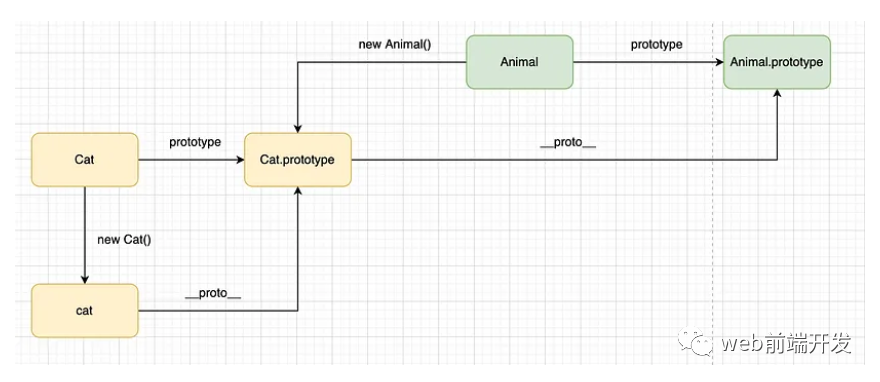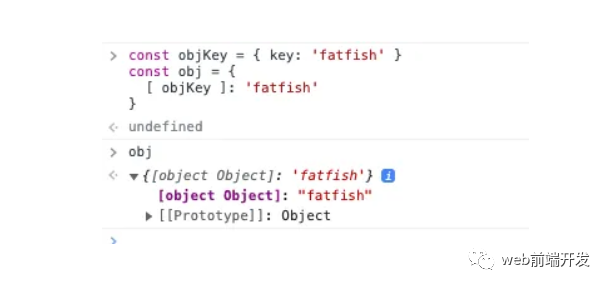每道题都会涉及到一个有趣的知识点,你可以尝试思考一下再看解析答案!

01、prototype?
请问输出是什么?
const Animal = function (){
this.type = 'animal'
}
const Cat = function (){
this.name = 'cat'
}
Cat.prototype = new Animal()
const cat = new Cat();
console.log(cat.__proto__ === Cat.prototype)
console.log(Cat.prototype.__proto__ === Animal.prototype)分析与解答
看看下面的图片,我想你就会知道答案。
- true
- true

02、nums 的值是多少?
请问输出是什么?
const len = 5
const nums = []
for (var i = 0; i < len; i++);{
nums.push(i + 1)
}
console.log(nums)分析与解答
首先,我认为这个问题并不是考察应聘者的编程能力。他正在检查候选人是否有眼睛方面的问题。如果你没有注意到分号,你一定认为 nums 是 [0, 1, 2, 3, 4]。
const len = 5
const nums = []
for (var i = 0; i < len; i++);
// At this time, i has become 6
{
nums.push(i + 1)
}
console.log(nums) // [ 6 ]03、要小心排序陷阱吗?
请问输出是什么?
const arr = [1, 30, 4, 21, 100000]
console.log(arr.sort())分析与解答
直觉上我们认为答案应该是[1, 4, 21, 30, 100000],但是我们没有传递比较函数,所以结果并不是我们想象的那样。
来自 MDN:
提示:指定定义排序顺序的函数。如果省略,数组元素将转换为字符串,然后根据每个字符的 Unicode 代码点值进行排序。
const arr = [1, 30, 4, 21, 100000]
// the array elements are converted to strings, then sorted according to each character's Unicode code point value
const charCodesOfArr = arr.map((num) => `${num}`.charCodeAt()) // [49, 51, 52, 50, 49]
// so the answer is [1, 100000, 21, 30, 4]
console.log(arr.sort())04、ES6模块导入导出知识
我相信这对你来说太容易了。直接写答案吧!
// a.js
export default () => "Hello medium"
export const name = "fatfish"
// b.js
import * as data from "./a.js"
console.log(data) // { default: function default (), name: "fatfish" }05、使用对象作为属性键
请问输出是什么?
const x = {}
const y = { key: 'y' }
const z = { key: 'z' }
x[y] = 'fatfish'
x[z] = 'medium'
console.log(x[y])分析
众所周知,使用对象作为属性键最终会是这样的,实际的键是 [object Object]
const objKey = { key: 'fatfish' }
const obj = {
[ objKey ]: 'fatfish'
}
console.log(obj) // { [object Object]: "fatfish" }
回答
那么答案是什么呢?也许你认为它是 fatfish,但medium才是最终的答案。
const x = {}
const y = { key: 'y' }
const z = { key: 'z' }
x[y] = 'fatfish' // x => { [object Object]: "fatfish" }
x[z] = 'medium' // x => { [object Object]: "medium" }
console.log(x[y]) // medium06、for循环中SetTimeout?
请问输出是什么?
for (var i = 0; i < 3; i++) {
setTimeout(() => {
console.log(i)
}, 1000)
}分析与解答
1秒后是否打印0,1,2?不会,1秒后1变成了3,所以3会连续打印3次。
for (var i = 0; i < 3; i++) {
setTimeout(() => {
console.log(i) // 3 3 3
}, 1000)
}如果我们想在1秒后打印出0,1,2怎么办?
// 1. Use let instead of var
for (let i = 0; i < 3; i++) {
setTimeout(() => {
console.log(i) // 0 1 2
}, 1000)
}
// 2. Using closures
for (var i = 0; i < 3; i++) {
((n) => {
setTimeout(() => {
console.log(n) // 0 1 2
}, 1000)
})(i)
}07、你知道一些基本的转换规则吗?
请问输出是什么?
console.log(+true)
console.log(!'fatfish')分析与解答
// The + operator
converts the Boolean to a number, true is converted to 1, and false is converted to 0
console.log(+true) // 1
// The string "fatfish" is a true value, use ! It will become false
console.log(!'fatfish')08、定义变量的陷阱!
请问输出是什么?
const fn = () => {
let x = y = 1000
x++
return x
}
fn()
console.log(typeof x)
console.log(typeof y)分析与解答
也许99%的工程师认为答案应该是*undefined,因为他们不知道如何定义全局变量。
const fn = () => {
// let x = y = 1000
// it is equivalent to the following code
let x = 1000
// Note that here, we define a global variable y
y === 1000
x++
return x
}
fn()
console.log(typeof x) // undefined
console.log(typeof y) // y equals 1000, so typeof y is number09、JavaScript 中的变量hoisting是什么?
请问输出是什么?
var x = 'fatfish'
const fn = () => {
// No.3
console.log(x)
var x = 'medium'
// No.4
console.log(x)
}
// No.1
console.log(x)
fn()
// No.2
console.log(x)分析与解答
第一题和第二题的答案很简单,大家都知道答案。但#3和#4就没那么容易了。
特别是因为 3 涉及变量hoisting的问题。
var x = 'fatfish'
const fn = () => {
// No.3
// Variable hoisting occurs when a variable is declared with var.
var x = undefined
// So at this time the value of x is undefined
console.log(x)
// var x = 'medium'
x = 'medium'
// No.4
// The value of x is medium
console.log(x)
}
// No.1
console.log(x) // fatfish
fn()
// No.2
console.log(x) // fatfish10、数组的长度?
请问输出是什么?
const nums = [ 10, 18, 0, 11, 9 ]
nums.length = 0
console.log(nums[3])分析与解答
答案是11吗?如果是11,说明你对数组的长度属性了解不够。
当你使用“nums.length = 0”时,意味着“nums”变空。
const nums = [ 10, 18, 0, 11, 9 ]
nums.length = 0 // it causes nums to become []
console.log(nums[3]) // undefined最后
以上就是我今天与您分享的10道关于前端的面试题,希望其中有您所需要的内容,也希望您能从中学习到新的知识。
最后,感谢您的阅读,并期待您的关注,您将会阅读到更多优质文章。



































